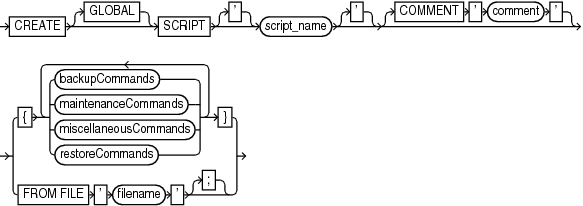2.13 CREATE SCRIPT
Purpose
Use the CREATE SCRIPT command to create a stored script in the recovery catalog. A stored script is a sequence of RMAN commands that is given a name and stored in the recovery catalog for later execution.
See Also:
-
Oracle Database Backup and Recovery User's Guide to learn how to use stored scripts
-
REPLACE SCRIPTto learn how to update a stored script
Prerequisites
Execute CREATE SCRIPT only at the RMAN prompt. RMAN must be connected to a target database and a recovery catalog. The recovery catalog database must be open.
If GLOBAL is specified, then a global script with this name must not already exist in the recovery catalog. If GLOBAL is not specified, then a local script must not already exist with the same name for the same target database. In you do not meet these prerequisites, then RMAN returns error RMAN-20401.
Usage Notes
A stored script may be local or global. A local script is created for the current target database only, whereas a global script is available for use with any database registered in the recovery catalog.
It is permissible to create a global script with the same name as a local script, or a local script with the same name as a global script.
Substitution Variables in Stored Scripts
RMAN supports the use of substitution variables in a stored script. &1 indicates where to place the first value, &2 indicate where to place the second value, and so on. Special characters must be quoted.
The substitution variable syntax is &integer followed by an optional period, for example, &1.3. The optional period is part of the variable and replaced with the value, thus enabling the substitution text to be immediately followed by another integer. For example, if you pass the value mybackup to a command file that contains the substitution variable &1.3, then the result of the substitution is mybackup3. To create the result mybackup.3, use two periods in the syntax &1..3.
When you create a stored script with substitution variables, you must provide example values at create time. You can provide these values with the USING clause when starting RMAN (see RMAN) or enter them when prompted (see Example 2-74).
Syntax
createScript::=
backupCommands::=, maintenanceCommands::=, miscellaneousCommands::=, restoreCommands::=)
Semantics
| Syntax Element | Description |
|---|---|
|
|
Identifies the script as global. Note: A virtual private catalog has read-only access to global scripts. Creating or updating global scripts must be done while connected to the base recovery catalog. |
|
|
Specifies the name of the script. Quotes must be used around the script name when the name contains either spaces or reserved words. |
|
|
Associates an explanatory comment with the stored script in the recovery catalog. The comment is used in the output of |
|
|
Specifies commands to include in the stored script. The commands allowable within the brackets of the |
|
|
Reads the sequence of commands to define the script from the specified file. The file looks like the body of a valid stored script. The first line of the file must be a left brace ( |
Examples
Example 2-72 Creating a Local Stored Script
Assume that you want to create a local stored script for backing up database prod. You start RMAN, connect to prod as TARGET, and connect to a recovery catalog. You create a stored script called backup_whole and then use EXECUTE SCRIPT to run it as follows:
CREATE SCRIPT backup_whole
COMMENT "backup whole database and archived redo log files"
{
BACKUP
INCREMENTAL LEVEL 0 TAG backup_whole
FORMAT "/disk2/backup/%U"
DATABASE PLUS ARCHIVELOG;
}
RUN { EXECUTE SCRIPT backup_whole; }Example 2-73 Creating a Global Stored Script
This example connects RMAN to target database prod and recovery catalog database catdb as catalog user rco. The example creates a global script called global_backup_db that backs up the database and archived redo log files:
RMAN> CONNECT TARGET "sbu@prod AS SYSBACKUP" target database Password: password connected to target database: PROD (DBID=39525561) RMAN> CONNECT CATALOG rco@catdb recovery catalog database Password: password connected to recovery catalog database RMAN> CREATE GLOBAL SCRIPT global_backup_db { BACKUP DATABASE PLUS ARCHIVELOG; } RMAN> EXIT;
You can now connect RMAN to a different target database such as prod2 and run the global stored script:
RMAN> CONNECT TARGET "sbu@prod2 AS SYSBACKUP" target database Password: password connected to target database: PROD2 (DBID=36508508) RMAN> CONNECT CATALOG rco@catdb recovery catalog database Password: password connected to recovery catalog database RMAN> RUN { EXECUTE SCRIPT global_backup_db; }
Example 2-74 Creating a Stored Script That Uses Substitution Variables
The following example connects RMAN to a target database and recovery catalog and uses CREATE SCRIPT to create a backup script that includes three substitution variables. RMAN prompts you to enter initial values for the variables (user input is shown in bold).
RMAN> CONNECT TARGET / RMAN> CONNECT CATALOG rco@catdb recovery catalog database Password: password connected to recovery catalog database RMAN> CREATE SCRIPT backup_df 2> { BACKUP DATAFILE &1 TAG &2.1 FORMAT '/disk1/&3_%U'; } Enter value for 1: 1 Enter value for 2: df1_backup Enter value for 3: df1 starting full resync of recovery catalog full resync complete created script backup_df
When you run EXECUTE SCRIPT, you can pass different values to the script. The following example passes the values 3, test_backup, and test to the substitution variables in the stored script:
RMAN> RUN { EXECUTE SCRIPT backup_df USING 3 test_backup df3; }
After the values are substituted, the script executes as follows:
BACKUP DATAFILE 3 TAG test_backup1 FORMAT '/disk1/df3_%U';
